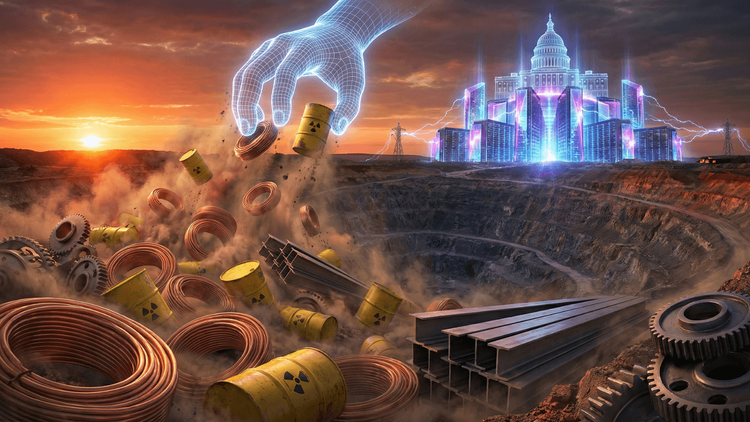Senate Foreign Relations Chair Warns Against China's Mineral Monopoly
America's reliance on Chinese critical minerals poses a serious threat to national security—Senator Jim Risch says it’s time to tap domestic resources and reclaim control.

The global race for critical minerals is no longer just an economic rivalry—it’s a national security showdown. At the heart of this growing crisis lies a dangerous dependency: the United States' reliance on China for the majority of its critical mineral needs. From the manufacturing of smartphones and electric vehicles to the arming of military defense systems, these minerals power modern civilization. Yet, while America holds vast untapped reserves within its borders, it continues to import many of these essential resources from an increasingly hostile geopolitical competitor.
The time has come for a drastic shift in U.S. policy. According to Senator Jim Risch, chairman of the Senate Foreign Relations Committee, the U.S. must break free from China’s grip on global mineral supply chains and reclaim its industrial autonomy. Risch’s argument isn't just political posturing—it’s a reality backed by facts, security threats, and a roadmap to change.
America’s Dependence on China Is a Strategic Liability
China’s influence over the critical minerals market didn’t happen by accident. The country has spent over $57 billion in the past few decades to dominate the global supply chain. This isn’t just about economic leverage—it’s a calculated move to hold geopolitical power. The result? The rest of the world, including the United States, has become dependent on China for minerals it already possesses.
The stakes couldn’t be higher. Consider antimony, a vital mineral used in ammunition, fireproofing military equipment, and nuclear systems. The United States currently has no domestic production of antimony, despite having substantial reserves waiting to be developed. Instead, China has cornered the market and is now tightening supply. This gives Beijing the ability to influence America’s defense capabilities with the flip of a switch.
This is not just a supply issue—it’s a sovereignty issue. How can the U.S. defend itself or sustain technological progress if it depends on a rival power for the materials to do so?
The Stibnite Solution: Idaho’s Untapped Potential
Senator Risch points to a solution hiding in plain sight: the Stibnite Gold Project in Idaho. This project holds an estimated 148 million pounds of antimony, making it the largest reserve outside of China’s control. But here’s the problem: it won’t start production until at least 2028. That’s 18 years after the project began.
Why the delay? Bureaucracy and red tape. American mining companies are being strangled by outdated regulatory systems that make it nearly impossible to move quickly from exploration to production. On average, it takes 29 years for a U.S. mine to become operational. In today’s fast-paced, high-demand world, that timeline is a national failure.
This inefficiency doesn't just apply to antimony. Idaho is also home to critical minerals like cobalt, molybdenum, niobium, and tungsten—all essential for energy systems, aerospace technology, and military readiness. Yet they remain locked in the ground while Washington drags its feet.
Trump’s Executive Order: A Turning Point in U.S. Strategy
Former President Donald Trump’s executive order on mineral independence marks a turning point. The order aims to eliminate unnecessary regulatory hurdles and fast-track permitting for domestic mining projects. It’s not about abandoning environmental standards—it’s about balancing responsible resource management with national interests.
Under the executive order, projects like Stibnite can be prioritized for fast-tracked approval. It also introduces the use of federal tools like the Defense Production Act and financing mechanisms to support U.S. mining companies. These measures aim to level the playing field and empower American producers to compete with China.
Trump's move comes with a message: America will no longer allow its enemies to control its future. Minerals will now be a strategic priority for the National Energy Dominance Council, ensuring they receive the attention and support they deserve.
Congress Must Now Step Up
Executive action can only go so far. Lasting change requires legislative muscle. That’s why Senator Risch is calling on Congress to support long-term, bipartisan strategies that restore U.S. mineral self-sufficiency. This includes cutting red tape, modernizing permitting systems, investing in processing infrastructure, and incentivizing private-sector innovation.
The key is consistency. American mining policy has ping-ponged from one administration to another, creating instability for investors and developers. What the industry needs is a long-term, dependable framework that gives companies the confidence to plan, invest, and build.
Without such a framework, America risks falling further behind in the global mineral race. We can’t afford to continue waiting 30 years for critical infrastructure while rivals like China and Russia press ahead.
Strategic Minerals Are the New Oil
In the 20th century, the world was shaped by oil. In the 21st century, it will be shaped by critical minerals. The countries that control the supply chains for lithium, cobalt, rare earths, and antimony will control the future of electric vehicles, renewable energy, semiconductors, and defense technology.
This isn’t just speculation—it’s already happening. China’s dominance in battery production and rare earth refining is no accident. They’ve built entire cities around mineral processing. Meanwhile, the U.S. is still debating whether it should streamline a permitting process that hasn’t evolved in decades.
We must stop thinking of mining as an environmental liability and start seeing it as an economic and security necessity. Of course, that doesn’t mean throwing caution to the wind. Environmental excellence and responsible resource development can go hand in hand. But without domestic production, all the clean energy policies and high-tech goals in the world will remain wishful thinking.
Time Is Running Out
The challenge is clear. The roadmap is in front of us. But what remains uncertain is whether America has the political will to act.
Senator Risch’s message is unambiguous: the United States must no longer depend on Communist China for minerals it can source at home. The risks are too great, and the consequences of inaction too dire. From national defense to clean energy to economic resilience, critical minerals are the foundation of the future.
By supporting domestic mining projects, revitalizing processing capabilities, and modernizing outdated policies, the U.S. can regain control of its destiny. The time to act isn’t next year or next term. It’s now.
America has the resources. It has the expertise. All it needs now is the resolve.






